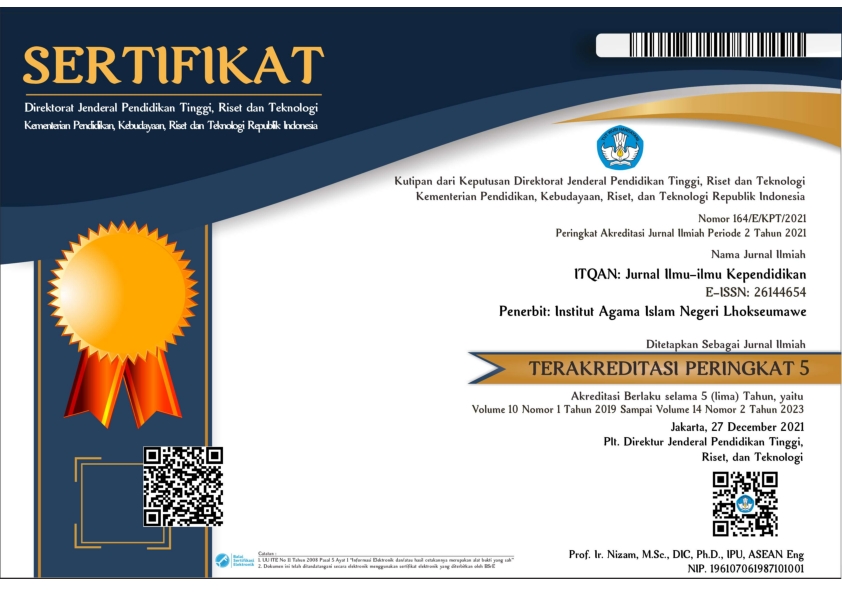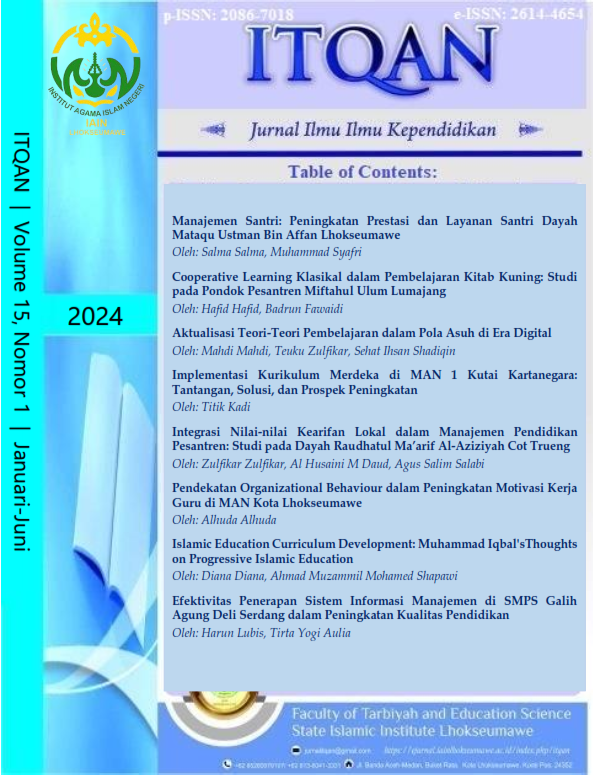Aktualisasi Teori-Teori Pembelajaran dalam Pola Asuh di Era Digital
Main Article Content
Mahdi Mahdi
Teuku Zulfikar
Sehat Ihsan Shadiqin
This research reveals the issue of actualizing learning theories in parenting in the digital era, using a research synthesis approach in exploring relevant theories and for the accuracy of the data collected, qualitative analysis was used. The results of this research; First, parents as educators and children as students are related by blood. Therefore, his authority is natural. So that in the process of interaction between parents and children is very close. Second, in behaviorism theory, parents act as teachers who provide stimulus, provide reinforcement, and manage the learning environment to achieve learning goals. In cognitivism theory, parents should offer activities that promote cognitive development, improve problem solving skills, and stimulate critical thinking. Meanwhile, in constructivism theory, parents must learn strategies for creating a learning environment for children, in order to foster curiosity, provide hands-on practical experience, and encourage collaboration. Third, challenges in raising children in the digital era, including; digital distraction, overstimulation, and balancing screen time.
’Ulwan, A. N. (2004). Child Education in Islam (M. G. dkk. (trans.); Ke-2). Dar Al-Salam.
Aisyah, S. (2019). Pendidikan Fithrah dalam Perspektif Hadist (Studi tentang Fithrah Anak Usia 7-12 Tahun). Al-Adzka: Jurnal Ilmiah Pendidikan Guru Madrasah Ibtidaiyah, 9(1), 51. https://doi.org/10.18592/aladzkapgmi.v9i1.3007.
Al Saedy, F. (2015). Parent-Child Communication: The Impact of Globalisation and Rapid Social Transformation in Khulais – Saudi Arabia. Queensland University of Technology.
Bariyah, S. K. (2019). Peran Tripusat Pendidikan dalam Membentuk Kepribadian Anak. Jurnal Kependidikan, 7(2), 228–239. https://doi.org/10.24090/jk.v7i2.3043.
Baumrind, D., Larzelere, R. E., & Owens, E. B. (2010). Effects of Preschool Parents’ Power Assertive Patterns and Practices on Adolescent Development. Parenting, 10(3), 157–201. https://doi.org/10.1080/15295190903290790.
Gagné, R. M. (1965). The Conditions of Learning. New York: Holt, Rinehart & Winston.
Harianti, E., & Siregar, N. S. S. (2014). Faktor-Faktor Penyebab Terjadinya Kekerasan Orang Tua terhadap Anak. Jurnal Ilmu Pemerintahan Dan Sosial Politik, 2(1), 44–56. https://ojs.uma.ac.id/index.php/jppuma/article/view/580.
Idris. (2017). Tri Pusat Pendidikan sebagai Lembaga Pengembangan Teori Pembelajaran. At-Ta’lim, 16(1), 162–178. https://ejournal.uinfasbengkulu.ac.id/index.php/attalim/article/view/827.
Irfan Taufan Asfar, M. I. A. A., & Halamury, M. F. (2019). Teori Behaviorisme (Theory of Behaviorism). Researchgate, February, 0–32. https://doi.org/10.13140/RG.2.2.34507.44324.
Lubis, H., Rosyida, A. H., & Solikhatin, N. H. (2019). Pola Asuh Efektif di Era Digital. PLAKAT (Pelayanan Kepada Masyarakat), 1(2), 102. https://doi.org/10.30872/PLAKAT.V1I2.2967.
Nissa, Febby A. K., et al. (2021). Aktivitas Fisik dan Screen TIME Remaja Di Kota Surabaya Pada Masa Pandemi Covid-19. Jurnal Sporta Saintika, 6(2), 200-214.
Pavlov, I. P. (1927). Conditioned Reflexes: An Investigation of the Physiological Activity of the Cerebral Cortex. (Translated by G.V. Anrep). London: Oxford University Press.
Peratutan Pemerintah Nomor 44 Tahun 2017 Tentang Pelaksanaan Pengasuhan Anak (2017).
Piaget, J. (1970). Science of Education and the Psychology of the Child. New York: Orion Press.
Kesumaningsari, N. P. A., Stauder, J. E. A., & Donkers, F. C. L. (2023). “Media Use and the Analytical Brain”: Screen-Based Media Use and Behavioral Preference in Indonesian Children [Penggunaan Media dan Otak Analitik: Penggunaan Media Berbasis Layar dan Preferensi Perilaku Anak Indonesia]. ANIMA Indonesian Psychological Journal, 38(2), e10. https://doi.org/10.24123/aipj.v38i2.5671.
Rekret, P. (2018). The Posthumanist Tabula Rasa. Research in Education, 101(1), 25–29. https://doi.org/10.1177/0034523718792162.
Rosen, L. D., & Samuel, A. (2015). The Distracted Mind: Ancient Brains in a High-Tech World. Cambridge, MA: MIT Press.
Saguni, F. (2020). Penerapan Teori Konstruktivis dalam Pembelajaran. Paedagogia: Jurnal Pendidikan, 8(2), 19–32. https://doi.org/10.24239/pdg.Vol8.Iss2.46.
Salami, S. (2018). Mendidik Anak dengan Cinta. Gender Equality: International Journal of Child and Gender Studies, 4(2), 29. https://doi.org/10.22373/equality.v4i2.4533.
Skinner, B. F. (1953). Science and Human Behavior. New York: Macmillan.
Sunariyadi, N. S., Made, I. A., Andari, Y., & Sugriwa, G. B. (2021). Implikasi Pola Asuh Orang Tua dalam Penumbuhkembangan Karakter Anak Usia Dini. Kumarottama: Jurnal Pendidikan Anak Usia Dini, 1(1), 49–60. https://doi.org/10.53977/KUMAROTTAMA.V1I1.266.
Supardan, D. (2016). Teori dan Praktik Pendekatan Konstruktivisme dalam Pembelajaran. Edunomic, 4(1), 1.
Thorndike, E. L. (1932). The Fundamentals of Learning. New York: Teachers College, Columbia University.
Ulwan, A. N. (1981). Pedoman Pendidikan Anak dalam Islam I. Asy-Syifa.
Undang-Undang Republik Indoensia Nomor 35 Tahun 2014 tentang Perubahan Atas UU Nomor 23 Tahun 2002 Tentang Perlindungan Anak (2014).
Vygotsky, L. S. (1978). Mind in Society: The Development of Higher Psychological Processes. Cambridge, MA: Harvard University Press.




